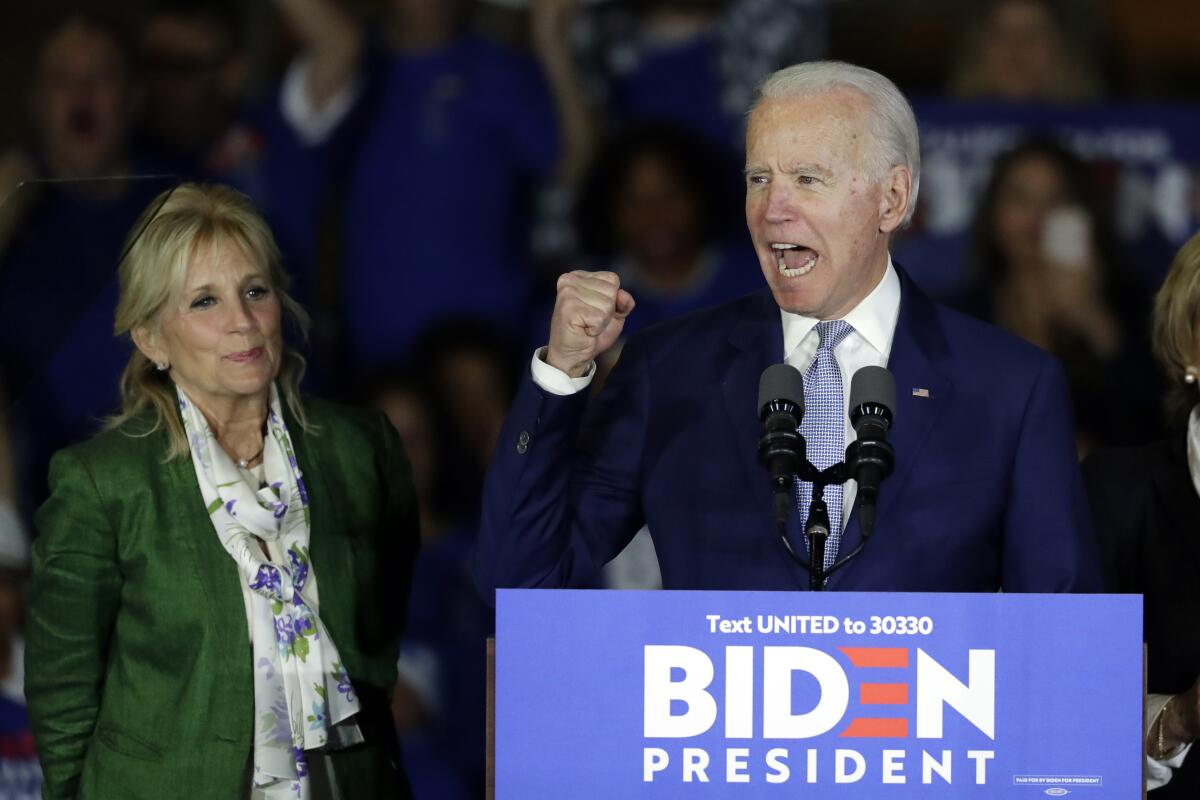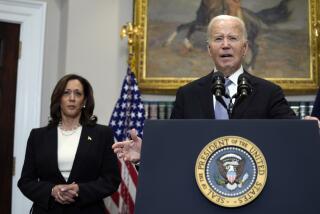Five takeaways from Super Tuesday

WASHINGTON — Got whiplash yet? This race looks nothing like it did a week ago.
It is no longer Bernie Sanders versus a muddled mess of candidates in the moderate middle. Joe Biden emerged from Super Tuesday as the clear counterweight to Sanders. And he emerged strong.
Biden’s last-minute surge dashed any hopes Sanders held of gaining an insurmountable lead toward the nomination. Indeed, the former vice president appeared likely to clear more delegates than Sanders from Super Tuesday, the longest of long shots a few days ago.
Biden quickly notched decisive victories across the South: Alabama, Arkansas, North Carolina, Tennessee and Virginia. Then he took Minnesota and Massachusetts, Sanders’ strongholds where Biden hadn’t even campaigned.
The Sanders victory in California was undercut by Biden’s sweep of so many other states. Biden was even edging out Sanders in delegate-rich Texas, the second-biggest prize, arguably the biggest surprise of the night.
So what are the top takeaways from the 14 contests on Super Tuesday, the biggest day on the Democrats’ primary calendar?
The establishment strikes back
Biden looked like a goner for much of February. He got creamed in Iowa, was creamed again in New Hampshire, and hobbled out of Nevada a distant second. His vast lead in the polls at the start of the race evaporated. He looked tired at events, overwhelmed on the debate stage, and meandering in the field.
Then came his sweeping victory Saturday in South Carolina. And on Tuesday he plowed through the South thanks to overwhelming support from African American voters and a big shift his way in suburban voters who decided at the last moment. He won states where he was barely on the radar last week.
What happened? The establishment fell into line. Big donors grabbed their checkbooks. Democratic heavyweights like former Virginia Gov. Terry McAuliffe and former Senate Majority Leader Harry Reid got off the sidelines and endorsed. Voters who had considered billionaire Michael R. Bloomberg moved to Biden en mass instead.
But the race still has a long way to go.
Will donors dig deep enough to help Biden compete with Sanders’ huge war chest? Will the organizational chaos in the Biden campaign ease now that the establishment cavalry is invested in boosting him toward the nomination? Will Biden finally stick to a coherent message on the campaign trail and stop wandering into gaffes and goofy non sequiturs?
Bernie is hitting bumps
Sanders appeared on a roll when the opposition was splintered and aimless. Now he faces a real fight. And the bruises started to show Tuesday.
Sanders won the big prize of California, as well as Colorado, Utah and his home state of Vermont. But he didn’t get the landslides polling had suggested even a few days ago. His drubbing in the South showed he has not overcome the weakness he faced in 2016, when he also struggled to appeal to African Americans.
The Vermonter also proved unexpectedly weak in his own backyard, losing Massachusetts and possibly Maine to Biden, who had invested almost no resources in the region.
Yet with small donors pouring millions of dollars into the Sanders campaign, the self-declared democratic socialist has built a formidable machine. It is still positioned to barrel over any number of obstacles — possibly including the Democratic Party establishment.
Mike Didn’t Get It Done
Former New York Mayor Michael R. Bloomberg spent more than half a billion dollars and won ... American Samoa.
The poor billionaires. They have been beat up and battered throughout this contest. Usually by the left. But Bloomberg is finding the mainstream isn’t thrilled to have him around either.
Bloomberg went from establishment savior to spoiler and now punch line. His entire case for running was built around Biden’s weakness, not his stunning comeback. Bloomberg spent with abandon to make the case that he was the only moderate who could best Sanders for the nomination. Voters roundly rejected him Tuesday.
Bloomberg’s case collapsed once America saw the candidate and not just his ubiquitous ads. He face-planted in his first debate. He was less a disaster in the second debate, but he did little to reassure voters who chiefly want someone who can trounce Trump. Now, voters have delivered their verdict and Bloomberg is under pressure to get out of the way and clear a path for Biden.
Both men are in their late 70s, have made voters cringe while onstage, and often seem out of step with this generation’s electorate. But Biden, who spent next to nothing, will emerge from Super Tuesday with a sizable bounty of delegates. Bloomberg, who spent more than any candidate in history, won but a smattering.
A month ago, with centrists splintering the vote and no clear challenge to Sanders, the billionaire’s timing looked impeccable. Now he looks more like a nuisance.
Warren isn’t giving up — yet
The race looks increasingly hopeless for Sen. Elizabeth Warren. The left has largely coalesced around Sanders. She has yet to win a state. Her third-place finish in Massachusetts was humiliating. She has no clear path to the nomination.
Will she push on?
As long as a contested convention remains possible, the Warren campaign insists she has a place in it. So have some very wealthy backers, who have pumped millions into a super PAC aimed at keeping her a visible presence — notwithstanding her earlier pledge to disavow such outside money during the primary.
Warren supporters argue she still can rack up enough delegates to play an influential role at the Democrats’ convention in Milwaukee — or even emerge as a compromise candidate.
Beyond that, they just like having her voice in the race.
She is a fierce presence on the debate stage. Warren’s broadsides arguably sank Bloomberg in the debates. She is an effective champion for equal rights, and makes a persuasive case for big economic change and expansive social programs to audiences that Sanders is not reaching.
But Super Tuesday was brutal for Warren and may have her looking toward the exit.
This will get uglier
A lot happened on Super Tuesday. But one thing that did not happen was any movement toward reconciliation between the warring wings of the party.
The ideological battle lines have only hardened. Sanders ticked off his litany of grievances with Biden in an angry, finger-wagging election-night speech. Biden has been unrestrained in ripping into the democratic socialist agenda that Sanders is promoting.
Now that the nomination battle has narrowed to these two, all signs suggest it will get more personal and more pointed.
Will they come together once a nominee is chosen? Perhaps. But the party risks lasting damage when Democrats are desperate for unity against Trump.
More to Read
Get the L.A. Times Politics newsletter
Deeply reported insights into legislation, politics and policy from Sacramento, Washington and beyond. In your inbox three times per week.
You may occasionally receive promotional content from the Los Angeles Times.











